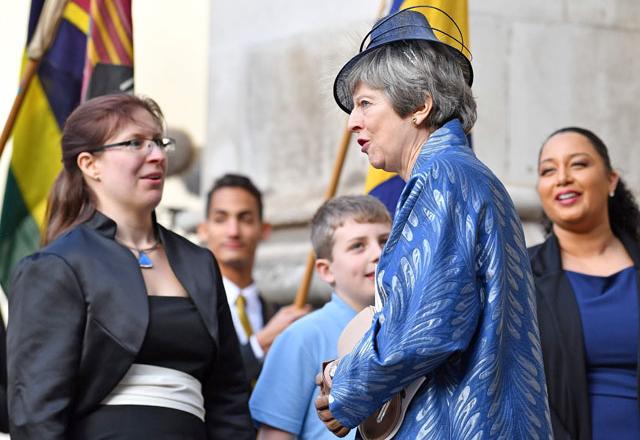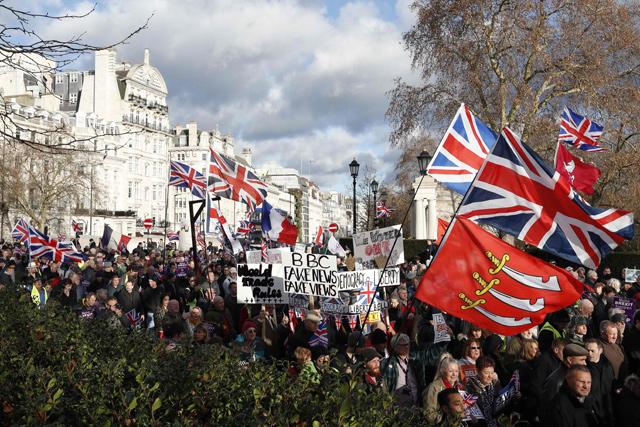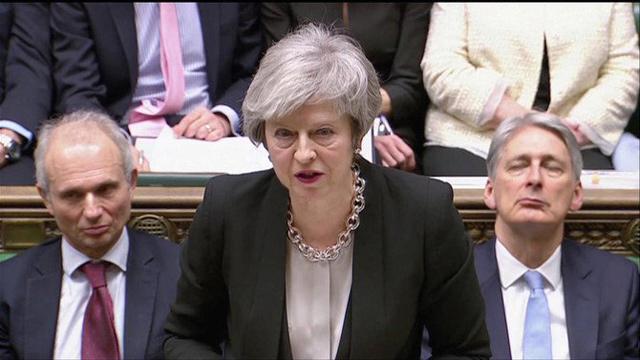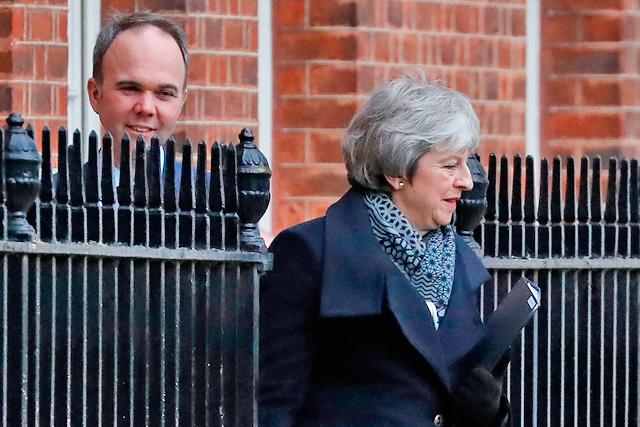You are here
Brexit deal close on Saturday, but UK Cabinet rejected it — EU sources
By Reuters - Mar 11,2019 - Last updated at Mar 11,2019

Britain’s Prime Minister Theresa May (centre) leaves after attending a Commonwealth Day Service at Westminster Abbey, in central London, on Monday (AFP photo)
BRUSSELS — A Brexit deal seemed close on Saturday after the EU indicated legal ways for Britain to unilaterally leave the contentious Irish border backstop, but the plan was rejected by British Prime Minister Theresa May’s Cabinet, sources in the bloc said.
Brussels’ Brexit negotiators on Monday updated envoys of the 27 states staying in the European Union on the status of the talks, which have stalled just 18 days before Britain is due to leave on March 29.
After rejecting in January the withdrawal agreement May negotiated with the EU, which included the backstop, the British parliament is due to hold a new series of votes on Brexit starting on Tuesday.
But London and Brussels are at loggerheads over the backstop, an emergency fix aimed at avoiding controls on the sensitive border between Northern Ireland and EU member Ireland.
“On Saturday evening, it seemed negotiating teams are close to an agreement,” the ambassadors were told, according to a source briefed on the closed-door meeting.
“But eventually, PM May had failed to convince her Cabinet, which she conveyed to European Commission President Jean-Claude Juncker during their phone call on Sunday evening.”
The 27 national EU leaders will discuss Brexit in Brussels on March 21 without May, and should not engage in direct negotiations with the British leader at the two-day summit, the ambassadors were also told.
May could go to Strasbourg, France, on Monday, where the executive European Commission and the European Parliament hold sessions this week. But that has not yet been confirmed by London.
The EU’s chief Brexit negotiator Michel Barnier said on Friday that the bloc could give London the unilateral right to leave its customs union after Brexit but that Britain would still need to keep the Irish border open.
That idea has previously been rejected by the UK as it would keep Northern Ireland inside the EU’s trading rules, which is unacceptable to the small Northern Irish party that props up May’s government.
May had not ruled out coming up with another UK declaration on the backstop on Monday, according to the briefing the EU ambassadors were given.
Brussels is concerned that she might ask British lawmakers to vote on potential backstop solutions that have already been rejected by the EU, which would not make reaching an agreement on the terms of Britain’s departure any easier.
“If she asks them to vote on a thing that is a no-go for us, it is a no-deal Brexit,” said an EU diplomat in comments reflective of growing exasperation within the bloc at Britain’s handling of the talks.
Brexit delay?
The EU rejected a proposal by British Attorney General Geoffrey Cox for a dispute-resolution panel that would not be obliged to seek guidance from the EU’s top court.
His idea for a “mini-backstop” would forgo Irish border checks on production standards or where goods are coming from, both essential to protecting the EU’s cherished single market.
Should no better solution be found, the backstop would have the UK follow some of the EU’s trade rules after Brexit. Critics say that risks trapping the UK in the EU’s orbit forever and undermines a key Brexit promise of pursuing independent trade deals around the world.
The EU has offered reassurances that the backstop would only ever be applied as the last resort, and only temporarily.
It has highlighted mechanisms London could use to get out of the backstop if the bloc fails to show enough “goodwill” in talks on a future trade deal for Britain that would maintain the open border between Ireland and Northern Ireland.
On Monday, the 27 EU envoys also discussed delaying Brexit beyond March 29, something they expect May to ask for soon, given the lack of a divorce agreement and fears of economic disruption in case of a no-deal split.
Lawyers told them a delay until EU elections due May 23-26 was legally safe and the latest date possible was before July 2, when the new European Parliament convenes.
Anything beyond that would mean that Britain would need to organise European Parliament elections on its soil, which the bloc does not trust it would do.
The EU is wary of undermining the parliament’s legal standing as it will play a role in electing the new executive commission later in the year and the bloc does not want any question marks over the legitimacy of its top institutions.
Related Articles
LONDON — Theresa May will push ahead with a crucial vote on her European Union exit deal, her Brexit minister said on Sunday, as senior MPs
LONDON — Prime Minister Theresa May asked the divided British Parliament to send a message on Tuesday to Brussels that it would support a Eu
LONDON — Prime Minister Theresa May on Monday published further assurances from the EU on the eve of a crucial parliamentary vote on her Bre




















